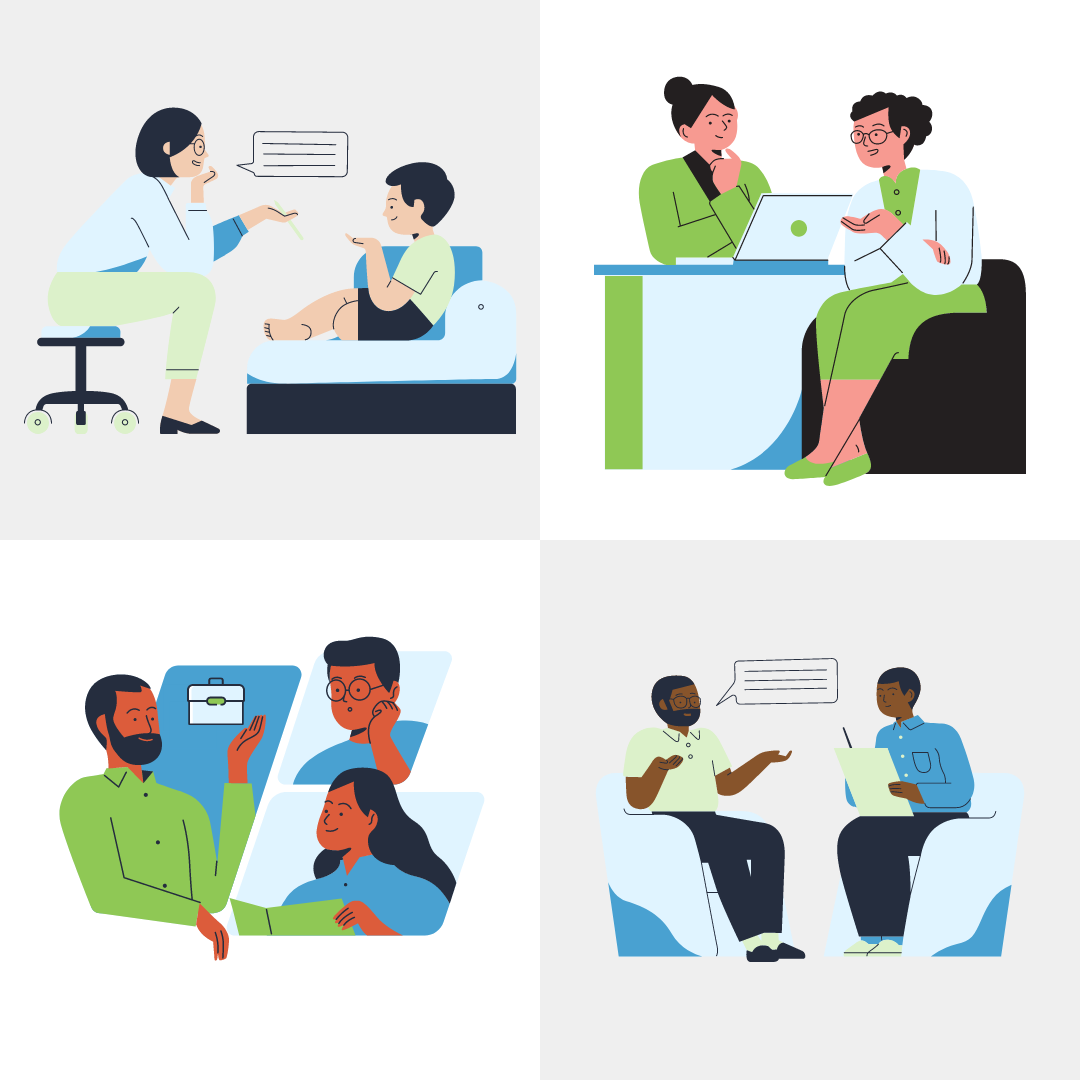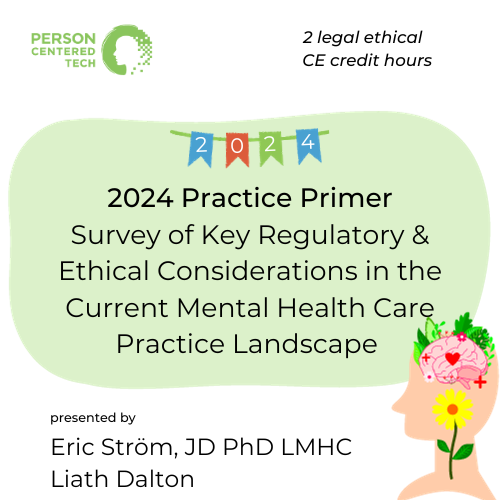2 CE Credit Hour On-Demand Training on what you need to know in 2024
2024 Practice Primer: Survey of Key Regulatory & Ethical Considerations in the Current Mental Health Care Practice Landscape
presented by Eric Ström, JD, PhD, LMHC
and Liath Dalton, Person Centered Tech Director
On-demand Self Study
Gain an understanding of how to strategically and realistically meet the legal-ethical requirements in these aspects of your practice.
This 2 hour law and ethics seminar is designed to equip counseling psychologists, clinical social workers, counselors, and marriage and family therapists with an introductory understanding necessary to navigate the most impactful issues and requirements of the current regulatory and ethics landscape for mental health professionals in a manner that centers client care and client rights.
We will address emerging technologies, with a particular focus on artificial intelligence (AI) and third-party tracking technologies: how do these developments impact providers’ surface area of risk exposure? What are the security, confidentiality, clinical, and ethical implications for their appropriate utilization in a mental health care practice? We will address federal regulatory changes for third-party payment that may have a significant impact on the coverage, payment to, and responsibilities of a mental health care provider. In the context of practical application of and compliance with HIPAA requirements, we will provide an update on a significant and consequential clarification of HIPAA Security Rule Standards applicability regarding electronic communications and phone service.
Real feedback from the live event
“I am a compliance professional… I do this for a living and still managed to learn stuff. Love PCT!”
“As compliance officer for a group practice, I trust and appreciate all that PCT offers. Thank you!”
“Clear explanations with supporting slides. Important to me was [the presentor’s] verbal pacing: I could follow what she was explaining. Slides very helpful.”
Who is this event for?
This course is designed for solo practitioners, group practice leaders, and group practice clinical staff members. It is also suitable for practices that consist of 100% in-person, 100% telehealth, or a mixture of in-person and telehealth treatment.
In person Practices
Hybrid Practices
 Teletherapy Only Practices
Teletherapy Only Practices

I’ve been watching several of your CE programs and, while I’ve always been impressed with your services, I just have to say, your programs are excellently done with production and content and simultaneously warm and accessible. I really appreciate what you do!
Privacy Risks
Identify potential risks to client confidentiality and privacy due to third-party tracking technologies
Strategies for AI
Create and describe an evaluation process for implementing artificial intelligence into a clinical practice with particular focus on legal-ethical considerations
Medicare
Identify and apply recent changes to Medicare provider eligibility to your practice

Phone Service
Develop a plan for utilizing phone service in a manner consistent with the HIPAA Security Rule requirements
Training is Step 2 of the PCT Way.

Course Details
2 CE Credit Hour. Self Study
Title: 2024 Practice Primer: Survey of Key Regulatory & Ethical Considerations in the Current Mental Health Care Practice Landscape
Authors/Presenters: Eric Ström, JD PhD LMHC; Liath Dalton, Person Centered Tech Director
CE Length: 2 CE credit hours, legal-ethical
Legal-Ethical CE Hours: 2 legal-ethical CE hour
Educational Objectives:
-
- Identify potential risks to client confidentiality and privacy due to third-party tracking technologies
- Create and describe an evaluation process for implementing artificial intelligence into a clinical practice with particular focus on legal-ethical considerations
- Identify and apply recent changes to Medicare provider eligibility to your practice
- Develop a plan for utilizing phone service in a manner consistent with the HIPAA Security Rule requirements
Syllabus:
- Introduction
- Educational Objectives
- Unit 1: Medicare
- Overview of regulatory changes
- Factors to consider when evaluating to opt-out
- Impact on payment, coverage, and responsibilities
- Practice steps to adapt changes
- Unit 2: AI in Mental Health Practice
- Introduction to artificial intelligence in mental health care
- Ethical and Legal considerations when implementing AI
- Developing an evaluation process for legal-ethical AI utilization
- Unit 3: HIPAA Security Rule Standards and Phone Service
- Updates on electronic communications and phone service compliance
- Developing a plan for utilizing phone service in line with HIPAA requirements
- Practical tips for managing your practice phone service in a HIPAA compliant manner
- Unit 4: Tracking Technologies & HIPAA
- Definition and examples of third-party tracking technologies
- Risks to client confidentiality and privacy
- Strategies for safeguarding PHI & complying with HIPAA
Meet Our Presenters
Presented by
Eric Strom, JD PhD LMHC and Liath Dalton, PCT Director

Eric Ström JD PhD LMHC, is an attorney and Licensed Mental Health Counselor in Seattle, Washington. As an attorney, Eric provides legal counsel, consultation, and guidance to mental health professionals. Eric’s counseling practice is focused on providing counseling services to combat veterans as well as providing supervision and consultation to other clinicians. Eric currently serves on the American Mental Health Counselors Association Ethics Committee, and is the ethics advisor for the Washington Mental Health Counselors Association. Eric has taught a range of courses in counseling and professional ethics at a variety of graduate and undergraduate programs.
Eric earned a PhD in Counselor Education and Supervision at Oregon State University, a Master of Arts Degree in Counseling Psychology from the Northwest School of Professional Psychology at Argosy University Seattle, graduated cum laude from Wayne State University School of Law in Detroit Michigan, attended the Hague Academy of International Law in the Hague Netherlands, and received a Bachelor of Arts degree in Linguistics from the University of Michigan.

Liath Dalton is PCT’s director and a co-owner. Liath is especially passionate about helping therapists be resourced and supported in navigating the security compliance process and identifying the solutions and processes that meet the particular needs of their practices. Liath’s consultation area of expertise is focused on selecting the right combination of services and tech that not only meet the legal-ethical needs of mental health practices, but also the functionality, efficiency, and cost-effectiveness needs as well.
Resources & Citations
-
● American Association of Marriage and Family Therapists. (2015). Code of Ethics . Alexandria, VA: Author.
● American Counseling Association. (2014). ACA Code of Ethics. Alexandria, VA: Author.
● American Mental Health Counselors Association. (2020). American Mental Health Counselors Association
Code of Ethics. Alexandria, VA: Author.
● American Mental Health Counselors Association. (2023). American Mental Health Counselors Association
Code of Ethics Addendum: Addressing Artificial Intelligence. Alexandria, VA: Author.
● American Psychological Association. (2010, and 2016 amendments). American Psychological Association
Ethical Principles of Psychologists and Code of Conduct. Washington, DC: Author.
● Google. (n.d.). HIPAA and google analytics – analytics help. Google.
https://support.google.com/analytics/answer/13297105?hl=en
● National Association of Social Workers. (2008). Code of Ethics. Washington, DC: Author.
● National Board for Certified Counselors. (2023). Code of Ethics. Greensboro, NC: Author.
● (OCR), O. for C. R. (2022, December 1). Use of online tracking technologies by HIPAA covered entities and business
associates. HHS.gov. https://www.hhs.gov/hipaa/for-professionals/privacy/guidance/hipaa-online-tracking/index.html
● (OCR), O. for C. R. (2022a, June 10). Guidance: How the HIPAA rules permit covered health care providers and health
Accuracy, Utility, and Risks Statement:
This program discusses strategies for complying with HIPAA and some other US Federal rules. It may not include information on all applicable state laws. Misapplication of the materials, or errors in the materials, could result in non-compliance with applicable laws or ethics codes.
Conflicts of Interest: None stated.
Commercial Support: none.
